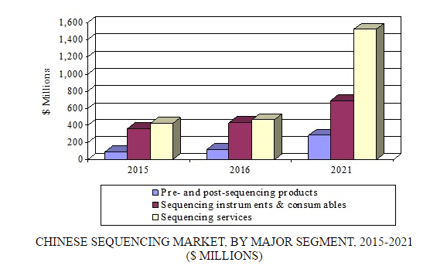
Nov 9, 2016
Blog Life Sciences , Biotechnology As China Targets Precision Medicine, Sequencing Expected to Flourish
The Chinese sequencing market is large, fast-growing, and dominated by brands from outside of China. BCC Research reveals in a new forecast that this market should hold great appeal for sequencing companies seeking strong growth and high profits in the next decade. Chinese sequencing companies rely heavily on the technologies and instruments provided by their partners in the United States and other countries. China’s 13th Five-Year Plan (2016–2020) targets precision medicine as a new focus for improving the country’s health and medical standards. As a result, the DNA sequencing market in China is expected to grow significantly during BCC Research’s forecast period.
As of mid-2014, the Chinese government had approved only a few companies for providing noninvasive prenatal testing (NIPT) services to the Chinese market. In early 2015, the government opened the market to more companies and hospitals, leading to strong growth in the clinical sequencing market. In 2015, more than 140 companies were created in China for NIPT, cancer detection and diagnostics, microbiology, bioinformatics, and other sequencing applications.
CHINA NOW HOUSES A NATIONAL GENE BANK
In September, China opened a national gene bank, which could eventually house 300 million genetic samples. The China National GeneBank (CNGB), based in Shenzhen, Guangdong province, has been dubbed “China’s Noah’s Ark” by the Chinese media. The billion-dollar center is the fourth national gene bank of its kind in the world, following similar projects in the United States, the United Kingdom, and Japan. It was set up by the Chinese government and the Beijing Genomics Institute.
As of September, the CNGB had already collected 10 million biosamples, including a cancer database with 3,000 samples and information on 50,000 genome mutations. “We hope to make the gene bank China’s, and even the world’s, biggest biological information data centre, like Google but in the field of life and health data,” Mei Yonghong, director of the centre, told the Xinhua news agency. The gene bank will contain human, animal, and plant data, as well as living samples.
For its analysis, BCC Research considered the three major segments of the Chinese sequencing market: pre- and post-sequencing products; sequencing instruments and consumables; and sequencing services. Pre- and post-sequencing products cover both the front end (sample preparation) and the back end (bioinformatics) of the sequencing workflow.
CHINESE SEQUENCING MARKET BY MAJOR SEGMENTS, 2015-2021

The Chinese sequencing market is expected to reach nearly $1 billion and $2.5 billion in 2016 and 2021, respectively, increasing at a five-year compound annual growth rate (CAGR) of 19.7%. Sequencing instruments, consumables, and pre-/post-sequencing products should grow from $546.8 million in 2016 to $976.6 million in 2021, demonstrating a five-year CAGR of 12.3%. As a segment, sequencing services should have the highest growth rate, with a five-year CAGR of 26.5%. Boosted by strong demand for NIPT, cancer detection, and other services, the sequencing services segment should reach $1.5 billion in 2021. As a sub-segment, clinical sequencing services for cancer should exhibit strong growth, reaching $437.1 million by 2021 at a five-year CAGR of 45.4%.
CHINA INITIATES GENETIC RESEARCH ON CONGENITAL HEART DISEASE
Medical experts in China are starting the nation’s first genome research into congenital heart disease. They will look for genetic causes and environmental factors that cause the disease, with the aim of being able to detect it early so that precise treatment can be initiated. Congenital heart disease affects up to 200,000 children annually in China, accounting for more than 25% of the nation’s inborn congenital cases. It is also the top reason for child death and disability.
Samples from a total of 2,000 patients and their parents, as well as 500 healthy people, will undergo full genome sequencing for comparative study to find mutated genes and risk factors during pregnancy, said experts from Shanghai Children’s Medical Center, which is carrying out the program. “The heart is the earliest organ formed and starts working during fetal development…any genetic mutation and risky influences from the environment can impact the heart’s normal development and cause congenital heart disease,” said He Lin, from the Chinese Academy of Sciences and the leader of the program.
However, the disease’s exact causes remain a mystery. The genome sequencing research program will spend three years collecting biological samples to do comprehensive research. This is aimed at finding effective genetic targets for early detection of congenital heart disease during early prenatal checks, to offer earlier intervention and guidance, and to help new drug development, said Dr. Jiang Zhongyi, president of Shanghai Children’s Medical Center. [Shanghai Daily, October 29, 2016]
“For many years, the Chinese market has relied heavily on instruments and consumables provided by foreign companies,” says BCC Research analyst Jason Chen. “For example, Illumina and Thermo Fisher Scientific enjoy good margins in China. At the same time, Chinese companies are trying to produce their own instruments to lower their costs.”
Indeed, Thermo Fisher has been putting emphasis on China. Last year, Thermo Fisher earned $1.4 billion in the Chinese market, which was approximately 8% of its total revenue. China is its second largest market after the United States. Thermo Fisher’s genetic analysis instruments are helpful to medical researchers who are studying genetic diseases such as cancer. Last year, there were 4.3 million new cancer cases and more than 2.8 million deaths linked to cancer in China.
Included in China’s 13th Five-Year Plan (2016–2020), precision medicine is predicted to be the next big thing as China moves to upgrade its healthcare landscape. By 2030, the industry expects investments to soar to approximately 60 billion yuan (USD 9 billion). Thermo Fisher has launched collaborations in China with Fu Wai Hospital in Beijing, West China Hospital in Sichuan Province, and The First Affiliated Hospital, Sun Yat-sen University in the south. The collaboration with Fu Wai Hospital will focus on genetic mutations related to cardiovascular diseases. [Shanghai Daily, September 14]
BCC Research’s new study, The Chinese Market for DNA Sequencing, analyzes the DNA sequencing market by product type, platform, customer type, value chain position, analysis type, and geography. Market drivers and trends, with data from 2015, estimates for 2016, and projections of CAGRs through 2021, are provided.

Synthetic biology is a multidisciplinary field of science that combines engineer...

Western blotting helps scientists separate and identify proteins. They do this b...

An important turning point in the development of regenerative medicine is marked...

We are your trusted research partner, providing actionable insights and custom consulting across life sciences, advanced materials, and technology. Allow BCC Research to nurture your smartest business decisions today, tomorrow, and beyond.
Contact UsBCC Research provides objective, unbiased measurement and assessment of market opportunities with detailed market research reports. Our experienced industry analysts assess growth opportunities, market sizing, technologies, applications, supply chains and companies with the singular goal of helping you make informed business decisions, free of noise and hype.